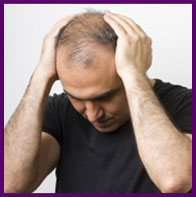Causes Of Hair Loss In Men
According to the American Hair Loss Association, about 85% of men will experie significant hair thinning by the time they turn 50, and some men may even begin to lose hair as early as 21.
We think even just reading those figures could make you lose your hair! However, if you equip yourself with the facts, you can tackle this challenging phase of your life with confidence.
The key is to know what type of hair loss you’re experiencing, what’s causing it, and the different treatment options available to you.

Types of Hair Loss


Involutional Alopecia
Involutional alopecia is the gradual thinning of the hair that occurs with age. It is a natural condition that happens as more and more hair follicles go into the telogen, or “resting” phase. In this phase, hair continues to get shorter with fewer hairs growing, and it becomes harder to regrow hair.

Androgenetic Alopecia
Androgenetic alopecia, also known as male pattern baldness, is a hereditary condition characterized by a receding hairline and gradual disappearance of the hair from the top of the scalp. This condition is responsible for the vast majority of hair loss in males. It can affect both men and women, but men can experience this type of hair loss as early as their teens or early 20’s. Men who suffer from male pattern baldness have actually inherited hair follicles that have a genetic sensitivity to Dihydrotestosterone (DHT). DHT shortens the lifespan of the affected hair follicles, and eventually stops the production of new follicles.

Alopecia Areata
Alopecia areata is an autoimmune skin disease that results in hair loss on the scalp and elsewhere on the body. It occurs when your immune system mistakenly attacks hair follicles, which is where hair growth begins. It is not permanent, but experts do not know the cause of the attack on the hair follicles.
Patients and doctors usually begin to notice when clumps of hair fall out, which causes small, round patches of visible and exposed scalp on top of the head. In about 90% of people with this condition, the hair may return within a few years.

Telogen Effluvium
Telogen Effluvium is a temporary condition that develops when there is a change in the number of hair follicles growing hair. It is caused by a large number of hairs entering the Telogen or “resting” phase at the same time, which causes the hair follicles to become dormant, and subsequent shedding and thinning occurs.

Causes for Hair Loss
There are many causes for hair loss, but luckily, in most cases, hair regrowth for men is possible.
Medical Conditions: Medical conditions, such as thyroid disease, lupus, diabetes, iron deficiency, eating disorders, and anemia can all cause hair loss. While hair loss is a normal response under these circumstances, it’s important to understand the effects of other medical conditions on the body. Once the underlying problem is treated, in many cases, the hair will return.
Diet: A balanced diet is key to good health. If the body isn’t getting enough essential vitamins, minerals, and nutrients, then the body’s organs, tissues, and cells may not be functioning properly.
Protein, iron, zinc and biotin deficiencies have all been linked to. In addition to deficiencies, having too much of certain nutrients, such as vitamin A or carotenes can also cause premature male pattern baldness.
Stress: Short-term, everyday stress, such as work or family life, is not going to cause your hair to fall out. A major life event though, or something that causes you to lose sleep at night or a change in appetite, could raise the level of stress hormones in your body. Hopefully this kind of stress will go away over time, and once it does, male hair growth will be possible again. Hormones
Dihydrotestosterone (DHT) shortens the growth cycle of your hair and increases the resting phase.
Overtime, hair begins to grow less and becomes shorter until it stops growing altogether. Unfortunately, genes can make certain hair follicles (usually in the front and crown of the head) especially sensitive to this hormone. Furthermore, excess levels of testosterone often result in higher levels of DHT and therefore an increase in hair loss or baldness.
Genes: More than 95% of male hair loss is due to male pattern baldness, which is genetic. Contrary to popular belief, this gene can come from either parent. Unfortunately this type of hair loss is impossible to prevent, but there are men’s hair growth treatments that, when used early enough in the hair loss process, can help counteract the genetic trait.
One of the most difficult parts of hair loss is knowing the right product or products to use to help treat it. Read on to learn the best treatment to use for the type of hair loss you have.

